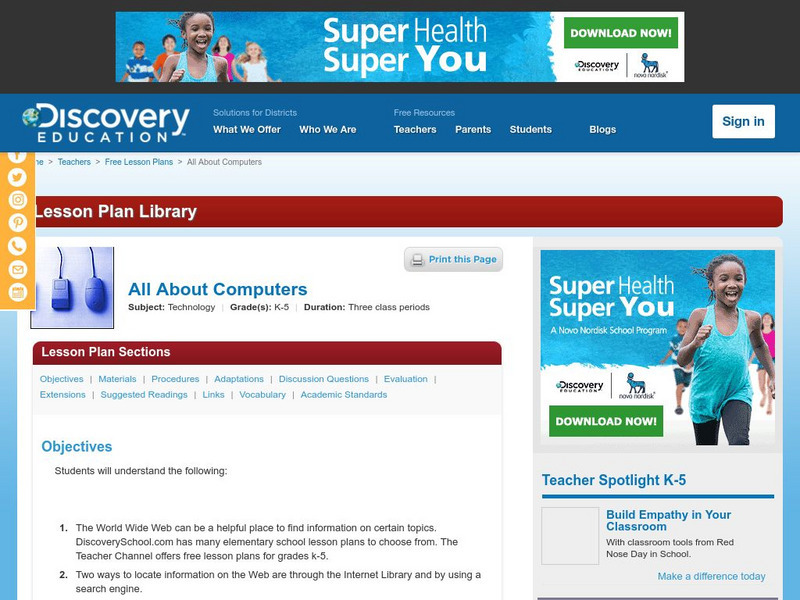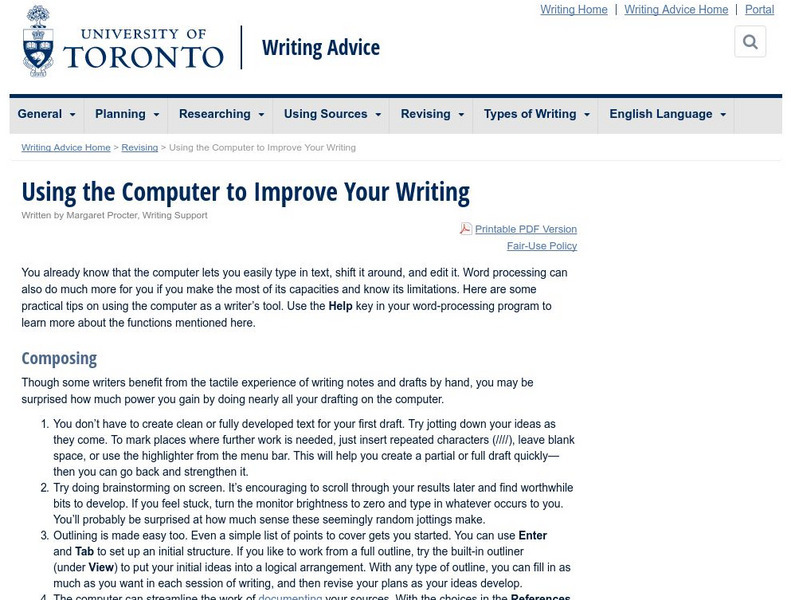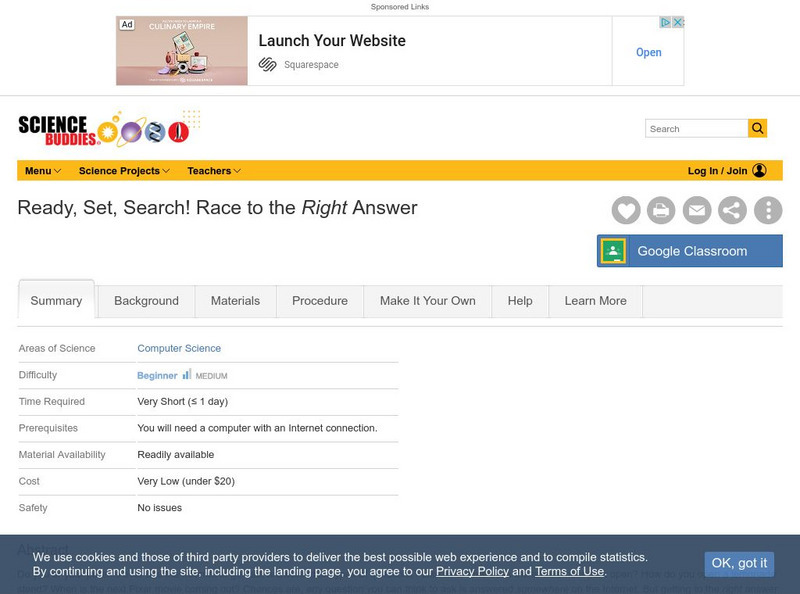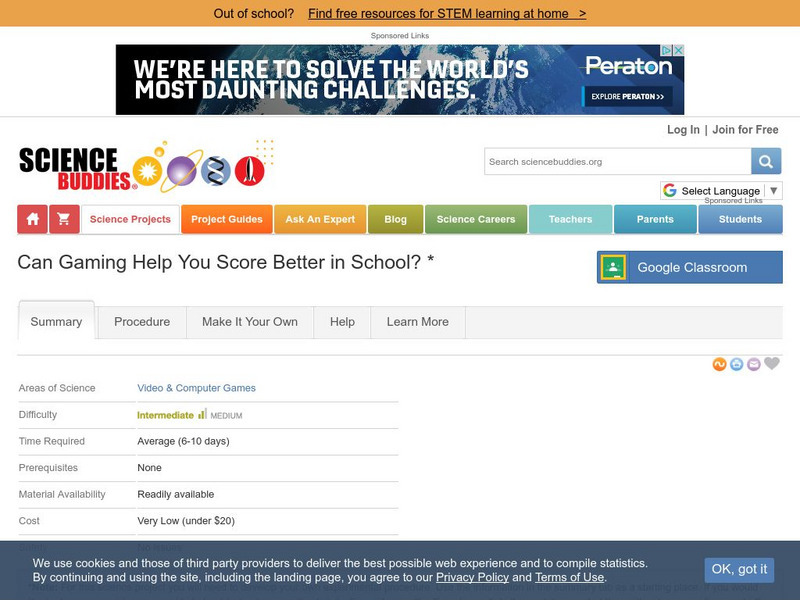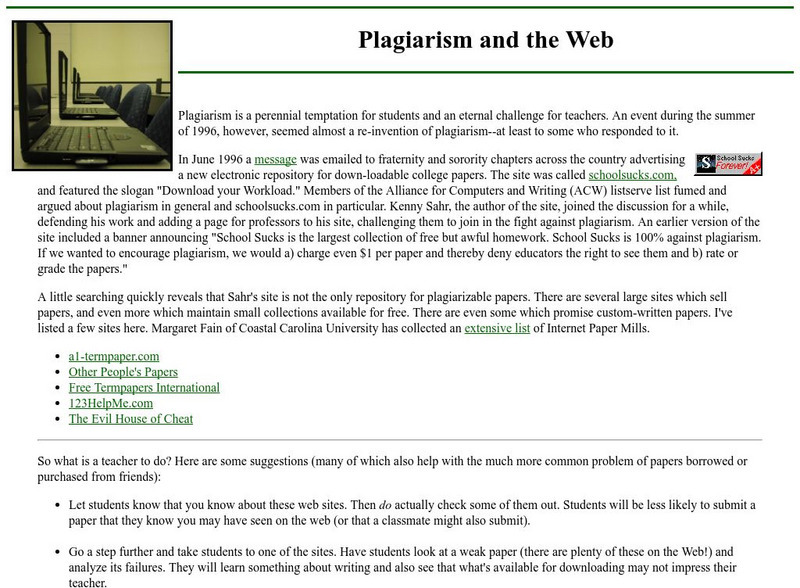Other
Safe teens.com: Online Safety Project
Find information on the internet as well as guidelines to follow in order to make surfing a fun and safe experience. The site also provides a link for parents to help them with children that will be using the internet.
Science Buddies
Science Buddies: The Perfect Marriage of Computer Science & Medicine
Find out the real explanation for why your parents are so weird. Here is a project that lets you explore the internet to find out why your "DNA blueprint" is so important to health and disease. In this project you will use methods that...
Federal Trade Commission
On Guard Online: Protect Kids Online
Become cyber smart! Learn some practical tips that will help guard you against Internet fraud and protect your personal information. Topics include kids' privacy laws, computer security, informational videos, and internet quizzes.
Eserver
E Server: Exploring Technoculture: Computers, Society, & Pedagogy
An annotated bibliography on technoculture. Contains brief reviews of book sources as well as a few Internet links.
Other
Pc World: Privacy 2000 in Web We Trust?
PC World provides an enormous article on internet privacy. Includes examples, problem areas, and tips and solutions resulting in more safety and privacy on the Internet.
Discovery Education
Discovery Education: All About Computers
Immerse pupils in the vocabulary of the World Wide Web in this lesson introducing the proper use of the Internet.
University of Toronto (Canada)
University of Toronto: Using Computers to Improve Your Writing
Tips from the University of Toronto on using word processing features as aids in composing and revising papers. W.9-10.6 Technology, CCSS.ELA-Literacy.CCRA.W.6, W.11-12.6 Technology
Science Buddies
Science Buddies: Getting More Out of Less : Google Hits and Search Terms
Google is the name of the most often used search engine on the Internet. "Googol" is the mathematical term for a 1 followed by 100 zeros. It's a very large number. This experiment will help you test different search terms and find out.
Science Buddies
Science Buddies: Mp3 Squeeze: How Much Compression Is Too Much?
Do you love to listen to your MP3 player while you're exercising, or listen to songs on the Internet? The relatively recent development of MP3 technology has made it possible to take a stack of CD's and store them on a device no bigger...
Science Buddies
Science Buddies: Can Gaming Help You Score Better in School?
There are a variety of educational computer games on the market in the areas of math, history, science, and language, as well as many simpler versions free on the Internet. This exercise asks that you make up a test based on the subject...
Other
University of Wolverhampton: Getting Started With File Transfer Protocol
An article describing the Internet File Transfer Protocol. Includes a FTP session, command choices, command formats, and FTP utilities.
Other
Wes Tech Vision: Strategies for Managing a Computer Lab
This online workshop covers a variety of strategies to more efficiently manage school computers and networks. Strategies will include sharing folders and CDs on the network, setting up read only "Template," folders on the network, using...
Other
Western Illinois University: Plagiarism and the Web
An essay on the challenge of plagiarism for teachers and the temptation for students, with helpful suggestions.
Other
The 101 Series: E Mail Etiquette
This site from the 101 Series describes different types of guidelines for sending emails. Some of the guidelines are for the convenience of the sender/receiver. Some of the guidelines have to do with etiquette (manners), and some are...
Other
Childnet International: Know It All: Primary Schools: Glossary of Technology
Glossary of technology terms lets you check your understanding of key terms associated with ICT tools, ICT technologies, and e-safety issues.
Other
Brad Templeton: A Brief Intro to Copyright
This personal site provides an article on the copyright issues. Includes the basics, creative work, making copies, commerce, fair use/fair dealing, and some legal basics.
Department of Defense
Do Dea: Web Design: Module 1: Understanding Your Role
In Module 1 of this course on web design, students look at how web content is delivered to a user and the path structure of files and folders. They learn what the role of a web developer is and the job requirements and salary levels....
Rock and Roll Hall of Fame
Rock & Roll Hall of Fame: Sti Lesson 15: The Changing American Landscape
The rise of American cities between 1865 and 1900 was spawned by the industrial revolution. Technological advancements in industry and transportation fathered the enormous growth of large cities across the United States. This led to the...
Alabama Learning Exchange
Alex: Phonemic Awareness With Technology
This lesson plan allows students to use the Internet to manipulate words by changing initial sounds. Students will use computer skills while learning how to change words by changing the initial sound.
Other
Indiana University Knowledge Base: What Is Ftp?
Information about the File Transfer Protocol, and how it is used to transfer files.
Other
Tech Soup: Networking 101: Concepts and Definitions
Starts with a simple definition of a network and then explores the components of a network, how a network works, types of networks, communication protocol, and hardware.





